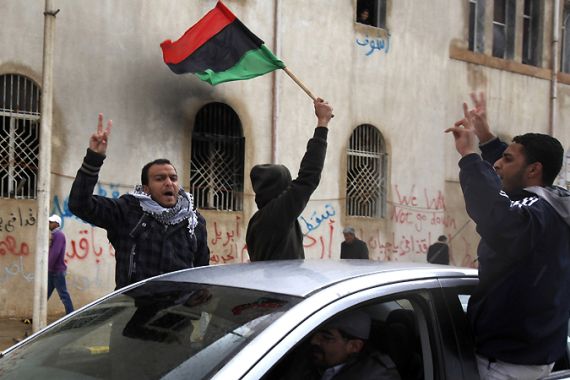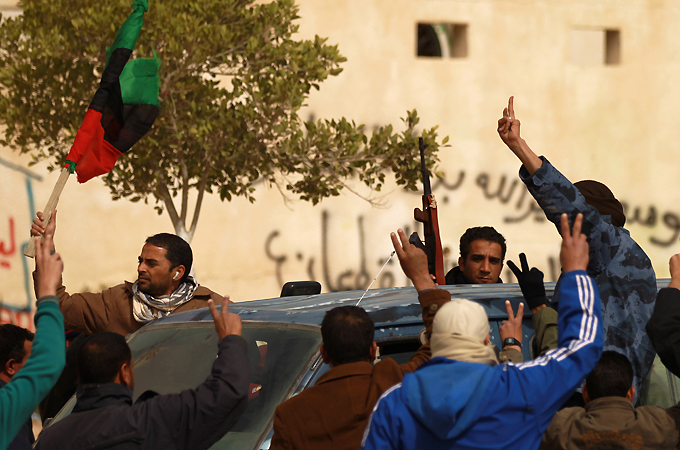World leaders weigh Libya response
EU considering sending humanitarian intervention force to country, as UK calls for international probe into violence.

 |
|
Gaddafi struggles to keep his authority as swathes of land appear to be controlled by pro-democracy protesters [AFP] |
International pressure is mounting on Muammar Gaddafi, the Libyan leader, to stop the violent crackdown on anti-government demonstrators, which has killed hundreds of people.
On Thursday, Britain urged the world to exert greater pressure on Gaddafi, while the European Union said it was considering sending a humanitarian intervention force to the country.
William Hague, the UK foreign minister, called for an international investigation into Libyan state violence, while
Gaddafi’s forces stepped up their struggle to crush protesters who have been calling for an end to his 41-year rule for the past 10 days.
“We will be looking for ways to hold to account the people who are responsible for these things and they should bear that in mind,” Hague said. “We will want some kind of international investigation.”
David Cameron, the British prime minister, warned that Gaddhafi’s continued violence against protesters was “completely unacceptable’.’
“It must stop and, as I am absolutely clear, if it does not stop there will be consequences,” Cameron said, speaking in Qatar on a tour of the Middle East and Gulf.
UN draft resolution
A UN Human Rights Council draft resolution on Libya is due to be discussed on Friday in Geneva.
The draft includes recommendations on sending an independent, international inquiry team to investigate alleged violations of international human rights law in the country.
It also recommends for the UN general sssembly to remove Libya from the Human Rights Council “in view of gross and systematic violations of human rights by the Libyan authorities”.
Europe and Russia on Thursday strongly condemned “the use of force against civilians” in Libya and urged respect for human rights and international law, the European Commission said.
A joint EU-Russia statement, to be officially released later on Thursday, states that the two sides “condemn and consider unacceptable the use of military force to break up peaceful demonstrations”.
Alain Juppe, the French defence minister, said on Thursday said he “hop[ed] wholeheartedly Gaddafi is living his last moments as leader”.
He repeated calls for economic sanctions to be imposed on Libya, including halting purchases of oil from the country.
The French foreign ministry has said in a statement regarding the violent government crackdown on protesters that “all options should be studied, including bringing the case before the international justice system”.
Juppe said the possibility of any foreign military intervention in the North African nation was not on the table, but
added: “I sincerely hope that Gaddhafi is in his final moments as chief of state.”
Biological and chemical weapons fears
Mustafa Abdel Galil, who resigned three days ago from his post as the country’s justice minister, spoke to Al Jazeera at a meeting of tribal leaders and representatives of eastern Libya in the city of Al Baida.
He warned that Gaddafi has biological and chemical weapons, and will not hesitate to use them against civilians, particularly in the case of the capital.
“We call on the international community and the UN to prevent Gaddafi from going on with his plans in Tripoli,” he said.
“At the end when he’s really pressured, he can do anything. I think Gaddafi will burn everything left behind him,” he warned.
Gaddafi opened his weapons stockpiles to international inspection and is known to have stockpiles of 9.5 metric tonnes of mustard gas. His government has reportedly destroyed 50 per cent of its chemical weapons cache.
In 2003 soon after the toppling of Saddam Hussein in Iraq, Libya agreed to dismantle its nuclear and chemical weapons programmes.
In return, the Bush administration resumed diplomatic relations and lifted economic sanctions.
The next year, Libya destroyed 3,300 unloaded aerial bombs used to disperse mustard gas and other chemical agents.
But disputes between Washington and Tripoli over funding and logistics have delayed plans to eradicate Libya’s chemical agents, as well as its chemical weapons production facility.
Libya was to have destroyed all 23 metric tonnes of mustard gas by the end of 2010, according to the Hague-based Organization for the Prohibition of Chemical Weapons OPCW). It was granted an extension until May 2011 and is known to have a remaining 9.5 metric tonnes of mustard gas.
The Obama administration is working to maintain security of the materials, Tommy Vietor, the US National Security Council spokesperson, said.
“We have continued to urge the Libyans to safely complete destruction of their remaining chemical weapons agent as quickly as possible. As part of that process, the Libyans have taken appropriate steps to secure their [chemical weapons] from unauthorised access,” he said on Thursday.
‘No plans to intervene’
NATO said on Thursday that the military alliance had no plans to enter the conflict at the moment.
During a visit to Ukraine, Anders Fogh Rasmussen, NATO’s secretary-general, said that the alliance “has no plans to intervene”.
“We have not received any requests in that respect. And anyway, any action should be based on a clear UN mandate,” he said.
AFP news agency reported on Thursday that Switzerland has ordered an immediate freeze on any assets that may belong to Gaddafi and his entourage, the Swiss foreign ministry said in a statement.
“The Federal Council (government) condemns the violence used by the Libyan strongman against the people in the strongest terms,” they quoted the ministry as saying.
“In view of the developments the Federal Council has decided to block with immediate effect any possible assets of Muammar Gaddafi and his entourage in Switzerland.”
Barack Obama, the US president, slammed the use of “outrageous” force against protesters, saying on Wednesday that his country is considering a “range of options” on Libya.
Obama said he would send Hillary Clinton, his secretary of state, to Geneva for a meeting of the UN Human Rights Council at the weekend and for talks with allied foreign ministers.
The president urged an end to attacks on peaceful protesters but stopped short of calling for Gaddafi to step down as ruler of the oil-producing North African nation and did not lay out any specific measures under consideration against the Libyan government.
Washington has previously said it is looking at imposing sanctions on Libya.
Sanctions discussed
After a meeting of EU ambassadors on Wednesday, the bloc did not announce sanctions against Libya, but Catherine Ashton, the EU foreign policy chief, said the EU stood “ready to take further measures’.’
The US state department said freezing Libyan assets, including those belonging to Gaddafi, were among the options being considered, and some US legislators urged direct action such as imposing no-fly zones.
According to a confidential US diplomatic cable released by WikiLeaks on January 31, the Gaddafi family controls $32bn in liquid assets, held by the Libyan Investment Authority (LIA, Libya’s sovereign wealth fund). Several US banks each managed $300-500mn, but most of the LIA’s investments, the cable said, are in London.
Swiss authorities announced on Thursday that they will freeze Libyan assets.
Leftwing and centrist opposition parties in Tunisia, Algeria and Morocco, meanwhile, made a joint statement on Wednesday on the government crackdown, calling on their nations to intervene.
“It is a genuine industry of extermination that has been unleashed. We must stand up to it, as any conscious individual would, and do everything to stop this massacre,” read the statement.
Italy, whose islands are just a few hundred kilometres from the Libyan coast, is worried about immigration.
Its interior minister said on Thursday that Libya’s pro-democracy unrest could create a humanitarian crisis that sends a million refugees fleeing across the Mediterranean to Europe.
“This is not just a problem for Italy and the Mediterranean countries, it’s a problem for Europe and the world,” said Roberto Maroni. “This is a catastrophic humanitarian emergency.”
Gaddafi is struggling to maintain his authority in the country, with major swathes of territory in the east apparently under the control of pro-democracy protesters.